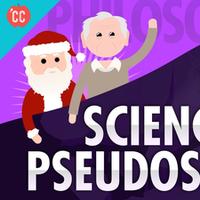08b. Karl Popper, Science, and Pseudoscience. Part 2/2.
(04:32)
This is the key point, for Popper science disconfirms, while pseudo-science confirms. He elaborated on this insight by establishing a series of distinct conclusions about science and knowledge. First, he said, it's easy to find confirmation of a theory if you're looking for it. Remember the presents under the tree? If you're looking for proof that Santa exists, you're not likely to keep searching for contradictory evidence after that. Second, confirmation should only count if it comes from a risky prediction, ones that could actually destroy your theory. Because Popper observed that every good scientific theory is prohibitive, it rules things out. This might sound strange, because no one wants to be wrong, but Popper says that every false belief we discover is actually good, because that gets us that much closer to believing only true things.
Next, Popper argued that the only genuine test of a theory is one that's attempting yo falsify it. So, if you were to test for Santa's reality, your method would require you to try to prove that he doesn't exist, rather than proving that he does. So, you stay up all night, waiting to catch him delivering his presents. This is risky, because if the person who actually shows up to put presents under the tree is your Dad, then you've destroyed the Santa hypothesis. On a very similar note, Popper also pointed out that irrefutable theories are not scientific. If it can't be tested, then your theory doesn't have much value. Like, you can only confirm that Santa is real by doing everything in your power to prove that he's imaginary, and then failing to do so. So you need to be tugging on Santa beards at the mall, you need to investigate reports of Santa sightings, and other weirdos caught breaking into peoples' houses through their chimneys. If you want to be able to really trust in your belied in Santa, in a genuinely scientific way, you need to put your belief to the test, in every way you can imagine. This is where Popper says that you have earned the right to call a theory scientific.
And finally, once you've disproven your theory, Popper said, you need to be willing to give it up. I mean, you can still cling to Santa myth, even after catching your Dad putting gifts under the tree, by accepting his lie that Santa had dropped the gifts off earlier, and that he was just "helping." But, if you're a scientist, you're gonna have to be willing to let your beliefs go, accept the evidence, move on. And this is the modern scientific thinking that we accept today; testable, refutable, falsifiable. You don't seek to prove scientific hypotheses right, you only prove them wrong. A lot of this might seem so obvious that maybe you're wondering why we're talking about it. But that's how right Popper was, he was one of those rare philosophers who actually managed to hit on an idea so right that we won't even really argue it anymore. ● Knowledge(06:55)
So, it sound like I've been talking mainly about science all this time. But Popper and his insights actually tell us a lot about knowledge, in the philosophical sense. For Popper, knowledge was about probability and contingency. We are justified in believing whatever seems most probable given our current data. And we should always be willing to revise our beliefs in the light of new evidence. In other words, our belief should be contingent on the data themselves.
This would not have satisfied Descartes, who was always concerned about certainity. But Popper never thought certainity was possible in the first place. If anything, he thought being certain of something causes you to close your mind, and that's not what we want. Always remaining open to the idea that your current beliefs might be wrong is the best way to get closer to truth.
So where does this leave us? Remember, we started out trying to prove that we know the things we thought we knew. But you have to be open to the idea that your beliefs might be false, because that's the only way that holding onto them can really mean anything. Otherwise, we're all just believing whatever we want, with no ground for adjudication between beliefs. You should keep that in mind, because that's the name of the game for the rest of this course. You only get to believe the things you have reasons for, and we're gonna start with the area that is hardest for most people, God. Hope to see you there.
● Conclusion(08:04)
Today you learned about Karl Popper, and his insights into science, pseudo-science, and knowledge, which might best be summarized as science disconfirms, while pseudo-science confirms.
This episode of Crash Course Philosophy is made possible by Squarespare, Squarespace is a way to create a website, blog or online store for you and your ideas. Squarespace features a user-friendly interface, custom templates and 24/7 customer support. Try Squarespce at Squarespace.com/CrashCourse for a special offer.
Crash Course Philosophy is produced in association with PBS Digital Studios. You can head over to their channel to check out amazing shows like Artrageous, The Good Stuff, and Blank on Blank.
This episode of Crash Course was filmed in the Doctor Cherly C. Kinney Crash Course Studio with the help of these awesome people and our equally fantastic graphics team is Thought Cafe.

